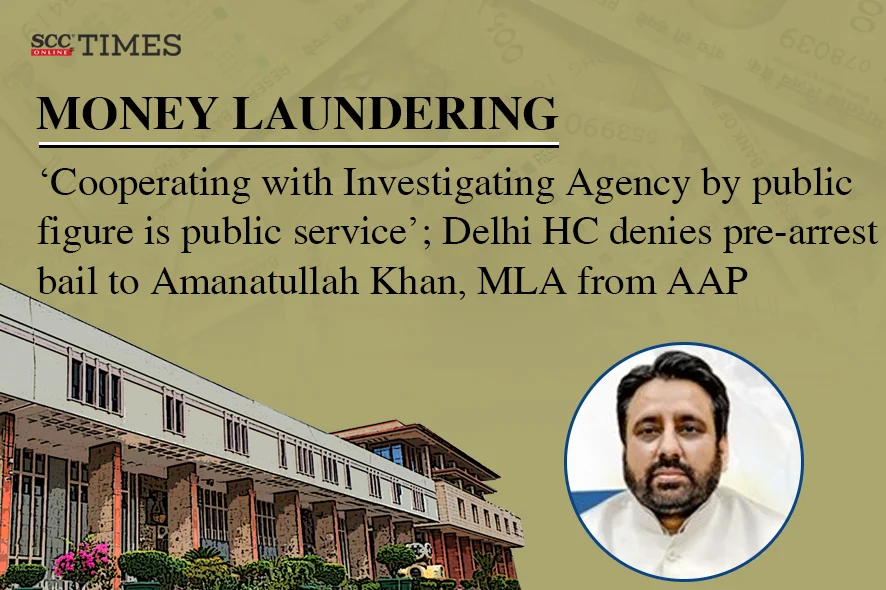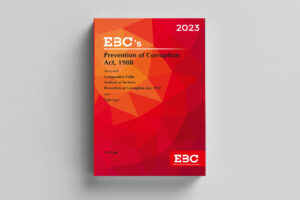Delhi High Court: An application was filed by petitioner, Amanatullah Khan under Section 438 of the Criminal Procedure Code, 1973 read with Sections 45 and 65 of the Prevention of Money Laundering Act, 2002 (‘PMLA’), seeking grant of pre-arrest bail in case registered for offences punishable under Sections 44 and 45 of the PMLA. Swarana Kanta Sharma, J.*, opined that the materials on record prima facie showed the offence of money laundering being committed by petitioner. Further, despite being summoned on six occasions till date, petitioner had not joined the investigation and did not cooperate with the investigating agency. Thus, this Court did not find it a fit case for grant of pre-arrest bail to petitioner.
Background
A case was registered against petitioner, a Member of Legislative Assembly (‘MLA’) of Delhi, from Aam Aadmi Party (‘AAP’); Mahboob Alam, the then CEO of the Delhi Waqf Board (‘DWB’) and other unknown persons, in relation to the predicate offences by CBI, AC-III, New Delhi for offences punishable under Section 120-B of the Penal Code, 1860 and Section 13(1)(d) read with Section 13(2) of the Prevention of Corruption Act, 1988.
The CBI had filed a chargesheet alleging that Mahboob Alam, IPS (Retd.), had been illegally appointed by petitioner, by issuing tailor made advertisement, passing resolution for his appointment before the closing date for receipt of applications and not calling other candidates for interview. It was also alleged that petitioner, who was the Chairman of DWB, had allegedly misused his official position and had engaged his relatives and persons known to him, to work in DWB. However, there had been no official order which allowed them to work in DWB. However, to make their appointments legal, an advertisement had been published on 24-4-2016 in Urdu newspapers.
Analysis, Law, and Decision
The Anti-Corruption Branch (‘ACB’), while carrying out investigation, had conducted search at various locations, owned and controlled by petitioner and his close associates, which had led to seizure of various incriminating documents/records/articles, including illegal weapons and three diaries containing details of huge cash transactions valuing more than Rs 100 crore during the years 2018 to 2022, which disclosed sale/purchase of various properties in Delhi, Dehradun, Telangana, etc.
The Court opined that there was no doubt that a person was entitled to all remedies, reliefs, and fundamental rights available to him under the Constitution and law, such as to seek anticipatory bail, when apprehending arrest by the investigating agency or to file a petition challenging validity of summons issued to him. However, to hold that filing of a petition or an application, which was not diligently pursued, would amount to a justification for not joining investigation despite repeated summons and notices being received from the law enforcement agency, would be a dangerous proposition. The Court further opined that courts of law could not allow a legal strategy, commonly used by a person, to obstruct investigation or join investigation as that would amount to stripping the investigating agency of their valuable right to summon a person under the law, to give information about a suspected crime.
The investigating agencies were involved in investigating offences, as per law, and it was the duty of every citizen to join investigation when called for. Thus, this Court should not be laying down that a citizen would not have a right to seek anticipatory bail, however, to make that a ground for not appearing before the investigating agency could not be permitted by the courts.
The Court stated that the power of Enforcement Directorate to summon a person was circumscribed under Section 50 of the PMLA. The Court relied on Vijay Madanlal Choudhary v. Union of India, 2022 SCC OnLine SC 929 and Enforcement Directorate v. State of Tamil Nadu, 2024 SCC OnLine SC 211, wherein the Supreme Court held that “a person so summoned under Section 50 of the PMLA was bound to respect the same”. Thus, the Court that not responding to or attending to the notices or summons of an investigating agency would amount to non-cooperation with investigation.
The Court opined that cooperating with investigating agency by a public figure was public service, as the public was entitled to know from the legal representative about the allegations levelled by an investigating agency based on the statements of witnesses recorded under Section 50 of the PMLA which were in the nature of judicial proceedings and admissible in law, and based on the evidence collected during the investigation. The Court also opined that an MLA or a public figure was not above the law of the land.
The Court opined that “repeated disobedience of summons of investigating agency was equivalent to obstruction of investigation; obstruction of investigation was equivalent to obstruction of administration of justice; obstruction of administration of justice was equivalent to eroding trust and confidence in criminal justice system; and eroding trust and confidence in criminal justice system would lead to anarchy and diminished respect for the rule of law”.
The Court opined that the material evidences gathered during the course of investigation under PMLA revealed that petitioner had acquired huge cash amounts, being the proceeds of crime out of criminal activities relating to his corrupt and illegal activities relating to illegal recruitment of persons in DWB, leasing out properties of DWB in unfair and illegal manner, misappropriation of DWB funds including others while being the public servant i.e., Chairman of DWB and MLA from Okhla Legislative Assembly of Delhi during 2015 onwards. In order to launder the same, petitioner had hatched a criminal conspiracy along with his close associates and others and thereafter had invested his proceeds of crime, in immovable properties through his associates. Petitioner had purchased immovable properties by concealing and suppressing their actual value which was very nominal in comparison to their actual sale value and actively concealed amounts that were paid in cash to the seller, which were the proceeds of crime acquired by petitioner out of his corrupt and illegal activities relating to the offences scheduled under PMLA.
Thus, the Court opined that the material brought before the Court was sufficient to attract bar under Section 45 of PMLA, and it prima facie showed the offence of money laundering being committed by petitioner. Further, despite being summoned on six occasions till date, petitioner had not joined the investigation and cooperated with the investigating agency. Thus, this Court did not find it a fit case for grant of pre-arrest bail to petitioner.
[Amanatullah Khan v. Enforcement Directorate, 2024 SCC OnLine Del 1658, decided on 11-3-2024]
*Judgment authored by: Justice Swarana Kanta Sharma
Advocates who appeared in this case:
For the Petitioner: Kapil Sibal, Senior Advocate; Rajat Bhardwaj, Adit S. Pujari, Mohd. Irshad, Kanish Raj, Kaustubh Khanna, Rishikesh Kumar, Roopali, Advocates
For the Respondent: Zoheb Hossain, Special Counsel; Manish Jain, S. Benjamin, SPP; Vivek Gurnani, Kartik Sabharwal, Kanishk Maurya, Vivek Gaurav; Pranjal, Advocates









